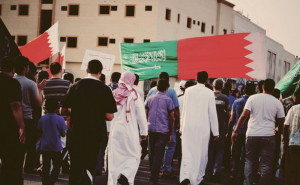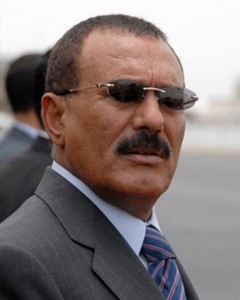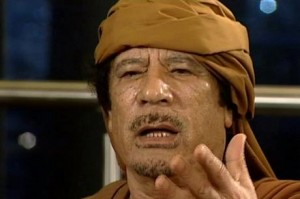A lot of people were overjoyed when Saudi Arabia’s military intervened in Bahrain and saved the Al Khalifa regime from collapse. Some even considered the intervention a Saudi victory over its regional rival Iran.
The real reason behind the Saudi intervention (or occupation) was to stop democracy from spreading in the Gulf, especially the Eastern Province of Saudi Arabia. The Saudis were prepared to intervene with or without the invitation of the Al-Khalifa family. They could not bear the sight of democratic revolutions encircling them from every side.
The Saudis have succeeded in manipulating the Bahraini revolution, which was a conflict between an authoritarian family and pro-democracy movement, to a regional and sectarian conflict between the persian shiites and the arab sunnis.
The Saudis helped the Al-Khalifa regime militarily, politically, economically, and by raising the issue of sectarianism in their media. Saud al-Faisal travelled to Egypt, Turkey and Moscow in order to get support for repressing the Bahraini democratic movement. An agreement was made between Washington and the West, whereby the West overlooks the events in Bahrain in exchange for unlimited Gulf support in Libya. The Gulf countries provided the political cover for Western military intervention, which was then followed by support from the Arab League and the Security Council. Saudi Arabia, Qatar and the UAE must pay the full costs of overthrowing Gaddafi, as well as financing and arming the rebels when necessary. On the media front, both Al-Jazeera and Al Arabiya channels neglected the repression in Bahrain and concentrated on Libya. The media coverage in the Gulf had a sectarian stench to it!
On the economic front, the Gulf states announced their readiness to support the government in Bahrain with billions of dollars. The Saudis told the Al Khalifa that they were prepared to compensation Bahrain for all its loses if the international financial institutions decide to leave the country.
The Saudi support provided the Bahraini Government with enough motivation to suppress its people. The consequences of Saudi intervention are as follows:
Firstly, Saudi Arabia perceives democracy in Bahrain as a threat which must be removed immediately. In the mid 1970s Saudi Arabia pressurised the Al Khalifa to annul the Constitution and abolish Parliament, which lead to uprisings that forced Bahraini royal family to undertake reforms in 2000.
The Al-Saud family cannot accept the fact that Bahrain is demographically and politically different from their kingdom. They exerted enormous pressure to slow down and eliminate the reforms process in the past and will continue to do so.
Some members of the Al-Khalifa family support Saudi Arabia’s policies in their Kingdom, especially the Prime Minister. The Al-Khalifa have lost their decision making powers once they accepted Saudi Arabia’s intervention. Bahrain has lost its independence to both Saudi Arabia and the United States.
Secondly, those who supported the suppression of the Shiites will be the next victims to Saudi’s military presence. The Saudi military presence will last for a long time and the House of Saud will not waste this opportunity to impose Saudi’s will on Bahrain’s internal affairs. The Saudis will be little the Al-Khalifa family in the not too distant future.
Moreover, the Saudi forces will cause tension in Bahraini society by supporting the Bahraini salafis against the majority shiites. The Bahraini sunnis will be pressurised by the Wahhabis, who will interfere in their daily lives just as they did in Iraq.
Today Saudi Arabia, its religious clerics and sectarian satellite channels serve the Al Khalifa regime. All of them want something in return for their efforts and the al-Saud in particular believe that in order to have a strong political influence in Bahrain, they most proliferate their Wahhabi ideology. Wahhabi thought and discourse was never accepted by the majority of Bahrainis.
In summery: Saudi intervention may have been viewed as a blessing by the Al-Khalifa family in the beginning. But those who think that they’ve won today will soon realise that they were never the winners, and that the loss is huge for all Bahrainis, shiites, sunnis and the Royal Family.






















